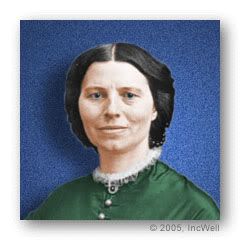
The Angel of the Battlefield
When the agonizing pain receded a bit, Jack Gibbs was able to think again. “I’ll never make it home,” he groaned. “Not in one piece, anyway.”He sighed and tried to shift his body to a more comfortable position on the cold, rocky ground. But the movement caused another warm gush, and he knew that if he were to live at all, he must lie still.“By the time they cart me back to the hospital behind the lines,” he thought, “I’ll either have bled to death or I’ll be in such rotten shape they’ll have to take my leg off. And what kind of husband would I be for Sue? A man with one leg!”
A black cloud swept over him, and he lay unconscious.When he opened his eyes again, Jack was sure he had died and gone to heaven. A woman was bending over him. That just couldn’t happen on a battlefield of the Civil War. No woman ever came on the field. No woman would want to! No woman would be allowed to!But there was a woman on the battlefield. Her name was Clara Barton.With the help of two soldiers, she lifted Jack onto a cot that the men removed from a horse-drawn van. She took some bandages out of her kit and bound up his leg. Then she gave him a pain-killing draft. Jack weakly sipped it down, and the men put him in a crude-looking ambulance.
Clara Barton had been doing this kind of work all day long. She had succored hundreds of the wounded, allayed their fears, relieved their pain, cleansed their wounds.Ever since the dreadful war had begun, Clara Barton had been worried about the men fighting at the front. She knew that wounded men were left lying on the field until the battle was over. She knew that only then were they collected and taken to hospitals—hospitals far behind the lines. She knew that if they survived this delay, the rough jolting of the wagons might well cause their unbound wounds to open. She knew that they often bled to death before they reached the hospital.Heartsick at this state of affairs, she determined to bring aid to the men right on the field.
First, she procured a van. Then she equipped it with medicine and first-aid supplies. And then she went to see the general.She was a slender little woman. To the commanding officer, she didn’t look exactly like battlefield material. In fact, her pet idea horrified him.“Miss Barton,” he said, “What you are asking is absolutely impossible.”“But General,” she insisted, “Why is it impossible? I myself will drive the van and give the soldiers what relief I can.”The general shook his head. “The battlefield is no place for a woman. You couldn’t stand the rough life. Anyway, we are now doing everything that can be done for our soldiers. No one could do more.”“I could,” Clara Barton declared. And then, as if she had just entered the room for the first time, she described all over again to the general her plans for first aid on the field.This interview was repeated again and again, but constant refusal did not deter her. Finally, the commanding officer gave in. Clara Barton received a pass that would let her through the lines.
During the entire course of the Civil War, she ministered to all she could reach. She labored unceasingly. Once she worked with scant rest for five days and nights in a row. Her name became a byword in the army, spoken with love and gratitude.As the government saw what she was actually accomplishing, it gradually afforded her more and more cooperation. The army supplied more vans and more men to drive them. More medical supplies were made available. But it was nevertheless an uphill battle all the way for the courageous Miss Barton.
When the war ended, Clara Barton might have been expected to take a well-earned rest. Instead, she was haunted by the thought of the agony of those unfortunate folks who did not know for sure what had happened to their husbands, their fathers, their brothers. She determined to learn the fates of these missing soldiers, and to send the information to their families. She worked at this task for a long time.Now she knew war first-hand. She knew what it did to men on the battlefield, and she knew what it did to the families they left behind.
When she heard that there was a man in Switzerland, by the name of Jean Henry Dunant, who had a plan to help soldiers in wartime, she immediately went to Switzerland to lend her aid. Dunant formed an organization called the Red Cross. Workers of this organization were to wear a red cross on a white background so that they could easily be identified. They were to be allowed free access to battlefields, so that they might help all soldiers, no matter what their nationality, race, or religion.Here was an idea that fired Clara Barton.
She came back to America and convinced the United States Government that it should join with the twenty-two other member nations to give money and supplies to an International Red Cross, organized to help soldiers in wartime.But Clara Barton added another idea to this great Red Cross plan. It was called “The American Amendment.”“There are many other calamities that befall mankind,” she said. “Earthquakes, floods, forest fires, epidemics, tornadoes. These disasters strike suddenly, killing and wounding many, leaving others homeless and starving. The Red Cross should stretch out a hand of help to all such victims, no matter where such disasters befall.”Today, the International Red Cross brings succor to millions of people all over the world. This was Clara Barton’s wonderful idea. Her great courage, great love, and great charity will ever be revered.


0 Comments:
Post a Comment
<< Home